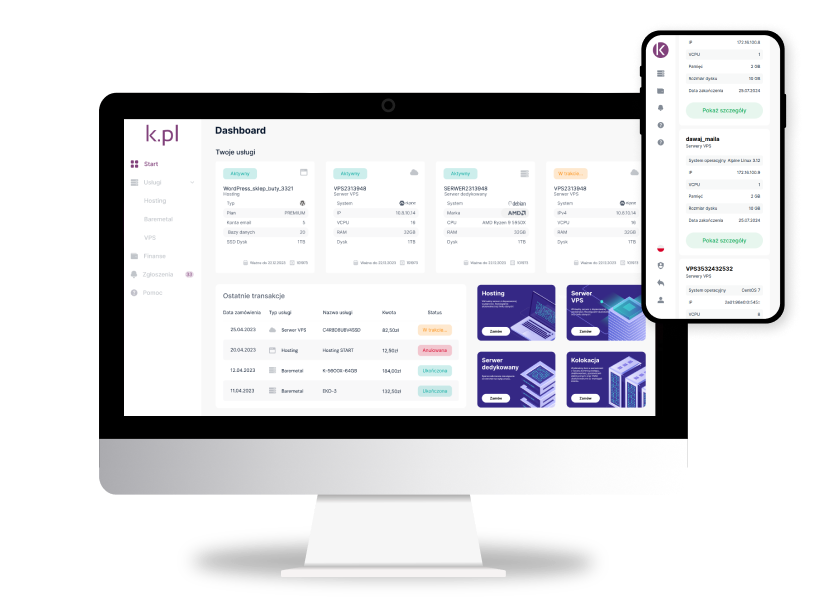BESTSELLER
500GB
2
2 GB
500 GB
IPv4 + IPv6
1 Gbps / unlimited
BESTSELLER
1TB
2
2 GB
1 TB
IPv4 + IPv6
1 Gbps / unlimited
BESTSELLER
2TB
2
2 GB
2 TB
IPv4 + IPv6
1 Gbps / unlimited
BESTSELLER
5TB
2
2 GB
5 TB
IPv4 + IPv6
1 Gbps / unlimited
The above promotional prices apply when entering into a 24-month contract. The indicated promotional price is the lowest price from the last 30 days.
Contact
Need custom solutions? Write to us!

news
Check out the latest news
Porównanie serwerów VPS k.pl: Wybierz idealne rozwiązanie dla siebie
April 17, 2025
Modernizacja serwerów Storage
Jan. 23, 2025
VPS Storage - CEPH
Dec. 11, 2023
FAQ
Check out the frequently asked questions
What is VPS Storage?
VPS Storage is a virtual server service based on the CEPH solution for data storage. With VPS Storage, users can securely store and manage their data, with great flexibility in terms of capacity and performance. Thanks to object-based distribution and triple replication, stored data is resistant to single disk and server failures.
What are the benefits of VPS Storage?
- SecurityYour data is stored in secure environments with triple replication.
- Flexibility: You can adjust disk space to meet your individual needs in real-time.
- Performance: Fast data access and the ability to integrate with other VPS services.
- Management: Easy management of storage space through an intuitive control panel.
Who is VPS Storage intended for?
VPS Storage is designed for businesses, developers, and private users who need secure, flexible storage space for data or to run applications in a virtualized environment. The service is ideal for growing storage needs and performance requirements.
How does data triple replication work in VPS Storage?
The triple replication of data in VPS Storage is based on the Ceph system, which ensures high data reliability and availability. Ceph is a distributed storage system that automatically replicates data across three independent storage devices. With this technology, even in the event of a disk or server failure, data remains safe and accessible from other locations. Ceph allows flexible scaling of storage space while maintaining high performance and data integrity.
Where are the servers storing data in VPS Storage located?
The servers storing data within VPS Storage are located in our own KORBANK Data Center, situated in Wrocław, Poland. This ensures a high level of security, performance, and data availability, as well as full control over the server infrastructure.
What are the options for scaling disk space in VPS Storage?
VPS Storage offers flexible options for scaling disk space according to user needs. You can increase or decrease disk space without interrupting server operations, making it easy to adjust to growing demands.
How quickly can I access my data in VPS Storage?
VPS Storage provides fast data access by utilizing modern storage technologies and high-speed network connections. Depending on the configuration, data access is almost instant, allowing for quick responses to changing needs.
Does VPS Storage support different operating systems?
Yes, VPS Storage is compatible with a wide range of operating systems, including popular Linux distributions (e.g., Ubuntu, CentOS, Debian). This allows you to use the service on the platform you prefer or that best suits your needs.

